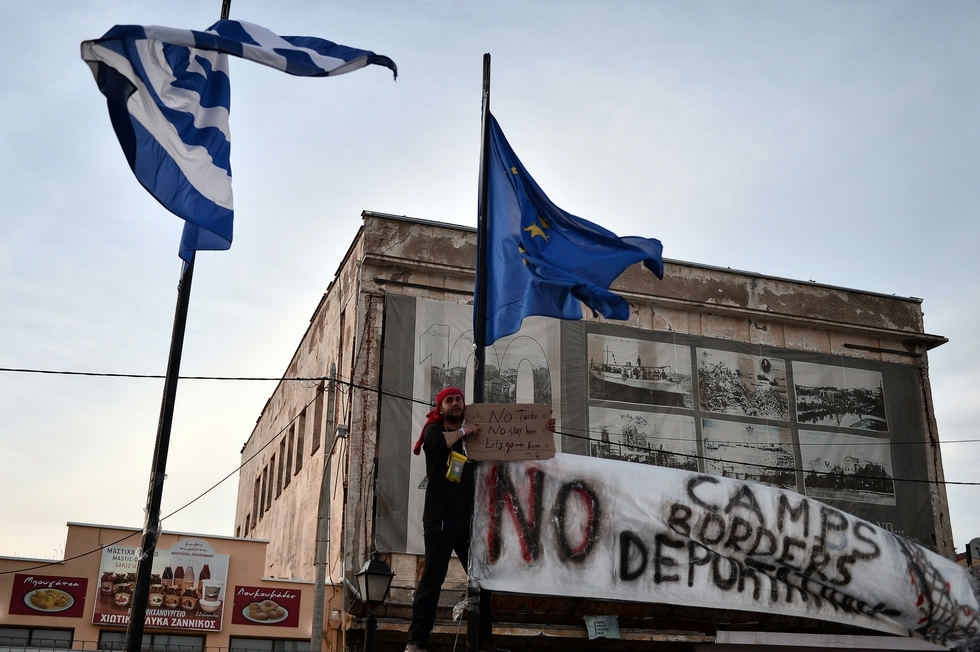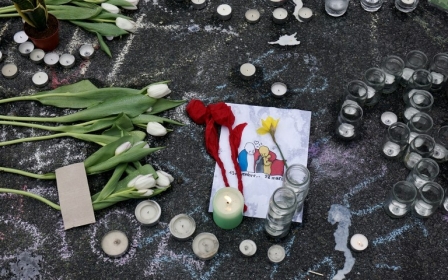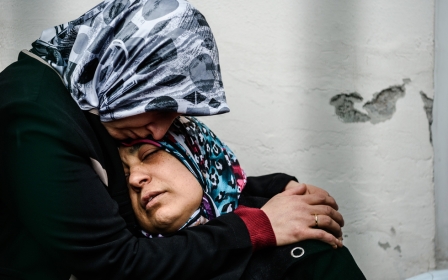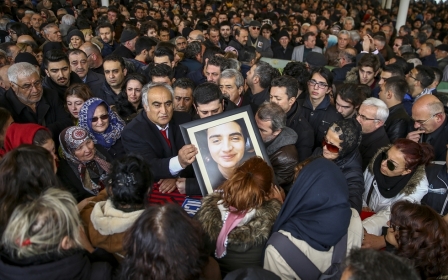Migrant deal opponents should aim arrows at Europe, not Turkey

When Syrian refugees first began fleeing to Turkey, escaping from the brutal regime of Syria's Bashar al-Assad, Ankara's policy was to keep its doors wide open. Turkey was accused by pundits and states of turning a blind eye to militants of the so-called Islamic State as they cross the 920 kilometre Syrian-Turkish border. When Turkey began tightening – although not shutting - its borders following threats from Syria and Western pressure, Ankara's critics began charging that Turkey was not allowing refugees to cross.
When many of those refugees made their way to Europe, critics pointed the finger at Ankara for allowing migrants to flood the continent. But when the European Union and Turkey agreed on a deal that would send back irregular migrants and refugees in exchange for Syrians waiting in refugee camps, the blame was again laid at the doors of Ankara – not the EU. The distorted logic was as follows: Turkey was bad for agreeing to take back the irregular migrants, but not the EU for sending them back in the first place.
'Good' EU, 'bad' Turkey
There is nothing wrong with criticising the deal, but the hypocrisy lies on piling your wrath on Turkey instead of the EU. The "good" EU was urged not to make a deal with the "bad" Turks who allegedly would send refugees back to war zones. But if such allegations are true then wouldn't it mean that the EU is the one that is sending them back in the first place?
In fact, European states have been returning refugees and asylum seekers directly to war zones long before the latest crisis and EU-Turkey deal. It was recently revealed that the UK alone has deported thousands of young people who came to Britain as children to their war-torn countries, including Afghanistan, Iraq, Libya and Syria. Official UK figures have confirmed sending back hundreds. Britain was sending Iraqi asylum-seekers back in 2009-2010, and on one occasion UK border officials "beat up" the deportees to force them into a plane flying from Britain to Baghdad.
Fast forward to 2015 and 2016 and you hear disturbing stories of how refugees and migrants were mistreated or beaten at European borders and camps, including the infamous Calais in France. Some of the open racism or Islamophobia directed at these poor refugees did not come only from border guards or an "uninformed" public but sometimes was also penned by European political leaders. When the pen fails them, some journalist resort to tripping up refugees. Yet pundits who claim to be pro-human rights say Europeans must scrap the deal with Turkey because Ankara – not the EU – is bad.
True, the situation in Turkey may not be ideal for refugees and Ankara should always strive to do better, but don't forget the country is the biggest host of refugees in the whole world. There are bound to be logistical problems. Add to that the fact that many Turks who oppose the policies of the ruling AK Party are hostile to the presence of Syrian (or Egyptian or Palestinian) refugees in Turkey.
It is rarely reported but Turkey remains a great place for many Syrians, who prefer their Turkish host to Europe - and Turkish refugee camps are far superior to those in the region or beyond. The Pope's taking of 12 refugees makes world headlines but Turkey's hosting of almost three million refugees goes virtually unnoticed, when not reported with scorn.
In fact, few will know that while the Syrian town of Kobane was in the headlines, its Kurdish-majority civilians were taking refuge inside Turkey. There is little mention of the Turkish crackdown on smugglers or Turkey's saving of tens of thousands of lives at sea. But if there is an odd negative story you can rest assured that it would become the representative of the narrative on Turkey.
Refugees who flee rape as a weapon of war carried out by pro-Assad forces or IS militants fall into sexual exploitation and harassment in Lebanon (which is also known for its sectarian treatment of Syrians), Jordan and a number of states in Europe, including Hungary, Croatia, Greece, and Germany.
End the conflict, stop the flow
However, such unfortunate incidents will continue to take place if there is no resolution to the Syrian crisis. From the outset of the uprising in Syria, Turkey was seeking a resolution for the crisis that would spare the blood of innocent civilians. First, the Turkish leadership sought to secure a promise from the Syrian government – an ally of Ankara at the time – to go down the route of reform not crackdown.
When it became clear that the Assad regime would rather wipe out much of the country's population than share power with the Syrian people, Turkey was left with no choice but to support the uprising. Not only for the sake of the Syrian people but also for the sake of Ankara's own threatened security, which fellow NATO members appear to care little about despite the rising number of terrorist attacks carried out against Turkey by IS, Kurdish or Marxist militants.
Paying attention to Turkey's calls for a safe zone to be established in northern Syria and taking actions to stop the Assad regime further demolishing the country could be a good start to help the plight of Syrians. That way the EU could reduce its refugee crisis and pundits would have one less reason to single out Turkey for bashing.
- Mehmet Solmaz is a Turkish-British journalist who covers news developments in Turkey and the region for the Daily Sabah newspaper. He also frequently appears in international media to comment on Turkish politics and diplomacy. You can follow him on Twitter @MhmtSlmz
The views expressed in this article belong to the author and do not necessarily reflect the editorial policy of Middle East Eye.
Photo: A refugee from Syria takes part in a protest at the Greek port of Chios where refugees and migrants who broke out from Vial detention center are camping-out on 3 April, 2016 (AFP).
New MEE newsletter: Jerusalem Dispatch
Sign up to get the latest insights and analysis on Israel-Palestine, alongside Turkey Unpacked and other MEE newsletters
Middle East Eye delivers independent and unrivalled coverage and analysis of the Middle East, North Africa and beyond. To learn more about republishing this content and the associated fees, please fill out this form. More about MEE can be found here.





